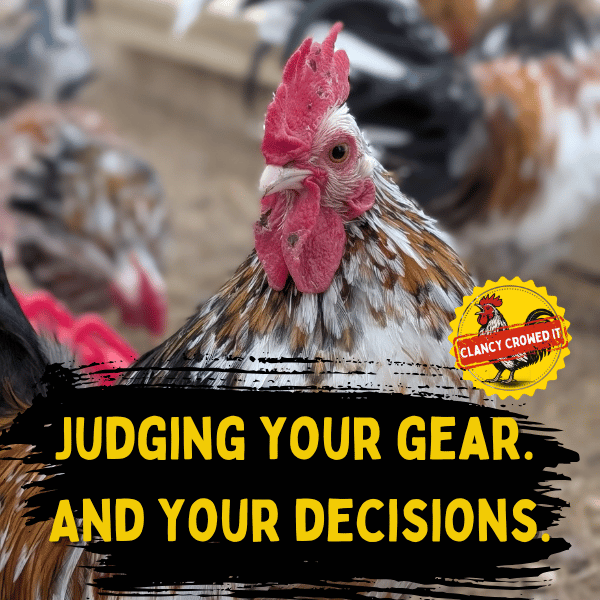Have you ever wondered why your chickens organize themselves the way they do? Just like in any bustling community, your backyard flock has its own set of social rules — known as the pecking order. This natural hierarchy helps chickens establish who's the top hen and who's going to find their place further down the line. Let's dive into the dynamics of this feathered society and uncover tips to manage it, ensuring your coop is a peaceful paradise for all your clucky citizens.
What is the Pecking Order?
The pecking order is an essential system of social organization among chickens. It is a structured hierarchy that affects nearly every aspect of their daily lives. From the earliest days in the brooder, chicks begin to display behaviors that will dictate their position within the group. They peck at each other in a manner that may seem aggressive but actually serves to establish their roles in the flock's social ladder.
Dominant chickens will assert themselves through various behaviors such as pecking at others, taking priority at food and water stations, and choosing the best spots in the coop for roosting. This pecking is not random violence but a method for chickens to communicate their dominance or submission. These interactions help to maintain order and predictability within the flock, which reduces overall stress.
As chickens grow and mature, their individual places in the pecking order can affect their access to resources and their overall health. High-ranking chickens eat first and choose the best nesting spots, which ensures they remain strong and healthy. Conversely, lower-ranking chickens might need to wait, which can impact their nutrition and stress levels if not managed properly.
Understanding the pecking order is crucial for anyone keeping chickens. It helps explain why certain chickens act aggressively and others seem shy or withdrawn. By recognizing these dynamics, keepers can better manage their flocks for optimal health and harmony.
How Chickens Establish Their Hierarchy
Establishing the pecking order is a fascinating and complex process that begins almost as soon as chicks hatch. Observing your flock, you'll notice distinct behaviors that signify the hierarchy's formation:
-
Initial Assessments: Chickens start by assessing each other's strengths and weaknesses through physical displays and vocalizations. This can include fluffing up feathers, clucking loudly, and more direct confrontations which rarely lead to serious injury but help sort out who's boss.
-
Testing Boundaries: Younger chickens often test their boundaries with older ones, attempting to climb the social ladder by challenging those above them. These challenges can include pecking, chasing, or blocking access to resources like food and water.
-
Role Solidification: Over time, roles become more defined. Dominant chickens assert their positions at the top by taking the first pick of food, perches, and nesting places. Subordinate chickens learn their place, showing submission by avoiding eye contact and waiting their turn for resources.
-
Monitoring and Maintenance: Even after the hierarchy is established, chickens continuously monitor and sometimes challenge their social order, especially if a new member is introduced or an existing member weakens due to illness or age.
Tips for Managing the Pecking Order
- Provide Plenty of Space: Overcrowding can increase tension and lead to more pecking. Ensure your coop and run have ample space for all your chickens to roam, feed, and sleep without feeling cramped.
- Multiple Feeding and Water Stations: To prevent bullying at feeding times, set up several feeding and watering stations around the coop. This helps lower-ranking chickens get their share without having to compete with the dominants.
- Watch for Bullying: Keep an eye on any chicken that may be bullying others excessively. Isolating a bully temporarily can sometimes help reduce stress in the flock.
- Introduce New Chickens Carefully: When adding new birds to your flock, do so gradually. Use a separate but adjacent space for new arrivals to allow them time to get acquainted with the existing members through a barrier, reducing direct confrontations.
Reducing Stress in the Coop
Stress can disrupt the social order and lead to health issues in chickens. Here are some ways to maintain a calm atmosphere in the coop:
- Create a Comfortable Environment: Ensure that the coop is well-ventilated, clean, and protected from extreme weather conditions.
- Provide Entertainment: Chickens are curious creatures. Providing perches, dust baths, and even hanging cabbages can keep them engaged and reduce pecking out of boredom.
- Regular Health Checks: A healthy chicken is a happy chicken. Regularly check your flock for signs of illness or injury, as these can affect their position in the hierarchy and their overall well-being.
Understanding and managing the pecking order in your backyard flock can lead to a harmonious chicken community. Remember, every chicken has its place, and with the right setup and care, you can ensure that every member of your feathered family feels cluckin' fantastic!












